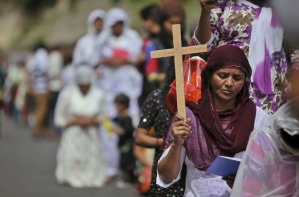
Although India's government under Prime Minister Narendra Modi has promised to protect everyone's religious freedoms in the subcontinent, Hindu extremists have recently carried out persecutions and attacks against Christians. Now Mari Marcel Thekaekara explains what it is like to practice Christianity within that environment.
In an editorial written by Thekaekara in The Hindu, the focus first turned to the meaning of conversion. India's legal system allows religious conversions to occur as long as it is done without coercion or under duress.
"I am a Christian," Thekaekara wrote. "I believe that conversion is abhorrent when it is done for the wrong reasons. I have always believed that every person can reach their God through their own religion."
Thekaekara acknowledged that bad actions have been committed in the name of Christianity throughout history, although many in the religion have tried to reform their ways.
"I am ashamed of the history of my religion where bigoted Catholics, both Spanish and Portuguese, carried out the decimation of millions of indigenous communities in South America and then converted the rest by the sword," Thekaekara wrote. "I am ashamed of the huge scandal in which many boys and girls were sexually abused by pedophile priests. But I am pleased that, finally, the pedophiles were exposed, punished and banished from positions of authority."
Thekaekara added that "much more reform is needed," especially when it came to introspection. She reserved special criticism for what he called "rice Christians," or those who convert mostly poor people to Christianity by offering free food and education to them.
"I have always considered that only rather stupid Christian missionaries would convert people by offering them food and education," Thekaekara said. "Technically and theologically, that is not a conversion at all."
The freelance writer then elaborated on the long history of Christianity in India, which started long before the British colonized India. The total population rate of Christians in that country currently hovers at 2 percent.
"All the might of the British Empire could not succeed in enticing a serious number of Hindus into the Christian flock," Thekaekara said. "Even within this 2 percent, significant conversions happened long before the British arrived, when St. Thomas landed on the coast of Kerala and preached his message in Tamil Nadu and Kerala. Those were genuine conversions, 2,000 years ago, which is what makes those churches particularly strong."
Thekaekara argued that the government's policy of converting everyone in India back to Hinduism, known as Ghar Wapsi, would be counterproductive in the long run, especially in the eyes of the international community.
"The new war on Christianity is counterproductive, and strategically stupid," Thekaekara wrote. "It will not only harm the image of India globally, it puts into jeopardy the millions of Hindus living peacefully and happily in the U.S., Britain, Europe, Canada and Australia. I have already begun to read about hate graffiti sprouting up on Hindu temples in the U.S."
Despite all the difficulties Christians faced in India, Thekaekara still opted to stay in her country and maintain her Christian faith.
"I stayed because I am Indian," Thekaekara concluded. "This is my home. And I, too, as retired IPS officer Julio Ribeiro said in a recent article, feel threatened for the first time in my life, in my country."







